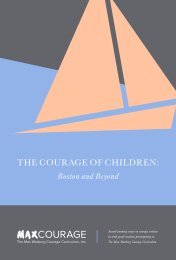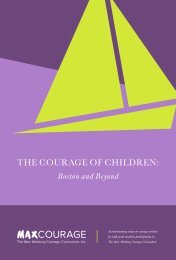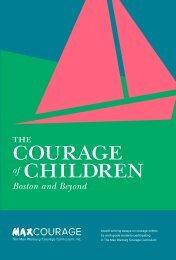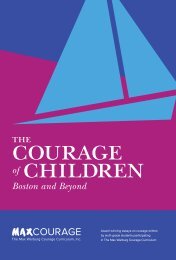The Courage of Children: Boston and Beyond XXXI
Award-winning essays on courage written by sixth-eight grade students participating in The Max Warburg Courage Curriculum.
Award-winning essays on courage written by sixth-eight grade students participating in The Max Warburg Courage Curriculum.
You also want an ePaper? Increase the reach of your titles
YUMPU automatically turns print PDFs into web optimized ePapers that Google loves.
For Max, acting was fun <strong>and</strong> easy, <strong>and</strong> so was schoolwork. He loved to be with<br />
his friends in school, <strong>and</strong> he loved to read <strong>and</strong> figure things out. He loved to<br />
laugh <strong>and</strong> play jokes. At school, they called Max the peacemaker. Kids would<br />
argue or get to fighting, but Max would get into the middle <strong>and</strong> try to calm<br />
things down. Being a good sport <strong>and</strong> thinking <strong>of</strong> the other guy were Max’s<br />
way. In tense situations, Max would be the one to lighten things up with a joke.<br />
Not everything came easy. Living in the city surrounded by buildings <strong>and</strong><br />
pavement, Max didn’t have much chance to play ball, but he wanted to. As<br />
soon as he was old enough, Max joined a baseball league. <strong>The</strong>y played on the<br />
<strong>Boston</strong> Common. Max was the youngest player <strong>and</strong> afraid <strong>of</strong> the fastballs<br />
coming straight at him. A couple <strong>of</strong> times he didn’t get out <strong>of</strong> the way <strong>of</strong> the<br />
ball <strong>and</strong> it hit him, but he didn’t let it get him down. For one thing, he knew<br />
Fred was watching <strong>and</strong> he knew as the big brother he’d better get right back<br />
up. Max was philosophical about his shortcomings. “I’ll be better next time,”<br />
he would say, <strong>and</strong> then he’d work at it. He never missed a practice. Even<br />
though he never got to be the best player on his team, by his third season his<br />
teammates knew they could count on him for a solid performance.<br />
During the summers, Max <strong>and</strong> his family left the city for the seashore.<br />
One morning in July 1990, when Max was eleven, Max’s mom needed<br />
something at the hardware store, <strong>and</strong> Max was looking for something to do.<br />
“I’ll go. Let me do it,” he said, <strong>and</strong> he got on his bike <strong>and</strong> pedaled <strong>of</strong>f toward<br />
town. About a mile from the house his front tire hit a pocket <strong>of</strong> s<strong>and</strong> the<br />
wrong way. <strong>The</strong> wheel skewed around sideways <strong>and</strong> Max fell. He l<strong>and</strong>ed on his<br />
shoulder, the breath knocked out <strong>of</strong> him. Hot burning pain filled his stomach<br />
<strong>and</strong> chest, making him curl in a ball <strong>and</strong> squeeze his eyes shut.<br />
Max knew something was wrong, more wrong than just a fall from his bike.<br />
Max’s mother knew something was really wrong as soon as she saw him<br />
walking beside his bike, steps slow <strong>and</strong> head down. Before he could get in<br />
the house she had him in the car <strong>and</strong> on the way to the local hospital<br />
emergency room.<br />
“Max fell <strong>of</strong>f his bike <strong>and</strong> he doesn’t feel right,” Max’s mom told the doctor.<br />
<strong>The</strong> doctor felt Max’s back <strong>and</strong> side <strong>and</strong> the smile left her face. “What’s this here?<br />
His side is all swollen. I think he’s ruptured his spleen. Max is in trouble.”<br />
“What kind <strong>of</strong> trouble?” Max <strong>and</strong> his mom said, almost at the same time.<br />
“I’m not sure, but we need to find out fast,” said the doctor, frowning<br />
with concern.<br />
She called an ambulance to take Max to <strong>Children</strong>’s Hospital back in the city.<br />
<strong>The</strong> <strong>Courage</strong> <strong>of</strong> <strong>Children</strong>: <strong>Boston</strong> <strong>and</strong> <strong>Beyond</strong><br />
xviii<br />
Siren <strong>and</strong> lights clearing a path, the ambulance rushed up the highway to<br />
<strong>Boston</strong>, barely slowing down for the tight corners near the entrance to the<br />
hospital. Max was wheeled straight into the emergency room.<br />
“This doesn’t look good,” the emergency room doctor said.<br />
“If my spleen is split, why don’t you operate on me <strong>and</strong> sew it up?” Max<br />
wanted to know.<br />
“Can you sew Jell-O? That’s what a spleen looks like. Not much to look at, but<br />
good to have because that’s what your body uses to clean your blood. Mrs.<br />
Warburg, this boy is going to be here for at least ten days.”<br />
Sad <strong>and</strong> frightened, Mr. <strong>and</strong> Mrs. Warburg made their plans. Max’s mom<br />
would stay with him, <strong>and</strong> his dad would take Fred back to the shore to keep<br />
things as normal as possible for him. <strong>The</strong> news from the hospital wasn’t good.<br />
It looked as if Max had leukemia, a dangerous cancer in his bone marrow, but<br />
the doctors weren’t sure which kind <strong>of</strong> leukemia he had. Some kinds were less<br />
difficult to cure, <strong>and</strong> some were easier to bear than others. Hoping their son<br />
had the commonest kind that could be cured, the Warburgs started to learn<br />
about leukemia.<br />
<strong>The</strong> results <strong>of</strong> the blood tests came back. Max had a rare form <strong>of</strong> leukemia,<br />
found in one in a million children. <strong>The</strong> lab doctor told Max’s parents, “Now<br />
that we’ve seen these results, I wonder how Max ever got himself <strong>of</strong>f the<br />
ground <strong>and</strong> back to the house the day he fell <strong>of</strong>f his bike. He must be a very<br />
determined boy.”<br />
“Yes, he is,” Max’s father said. “He is going to need to be.”<br />
It was Dr. Susan Parsons who told Max what he had. “Leukemia is hard to<br />
beat. You’ll have to have chemotherapy <strong>and</strong> radiation stronger than one<br />
hundred thous<strong>and</strong> X-rays. In order to test your blood <strong>and</strong> feed you, we’re<br />
going to have to make an incision near your heart <strong>and</strong> insert a tube. You can’t<br />
play ball <strong>and</strong> you can’t play soccer or ride your bike. If your spleen gets hit<br />
again, it will kill you.”<br />
Max thought a bit. “Tell me what is going to happen.”<br />
“You have to have a bone marrow transplant. Do you know what that is, Max?<br />
That means taking the fluid out <strong>of</strong> the middle <strong>of</strong> all your bones <strong>and</strong> then<br />
putting in the fluid from someone else’s bones in its place. We can’t do it<br />
unless we can find the right donor -- someone whose bone <strong>and</strong> blood type<br />
match yours almost exactly. Often, not even members <strong>of</strong> your own family are<br />
a close enough match. Right now, there are about six thous<strong>and</strong> people out<br />
there looking for the one perfect match to save their lives. You’ll be joining<br />
Volume <strong>XXXI</strong><br />
xix









